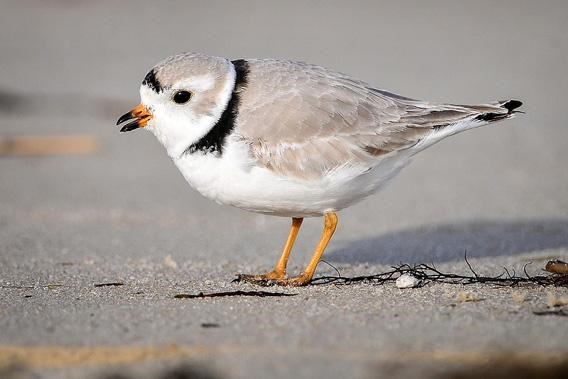It may still feel like summer to you and I, but Piping Plovers have already begun to prepare for the winter.
“Piping Plovers are small migratory shorebirds that nest in Saskatchewan during the summer months, and spend the winter months on the coastal beaches of the Gulf of Mexico and the Caribbean Islands such as Cuba,” says Rebecca Magnus, Habitat Stewardship Coordinator with Nature Saskatchewan. “Piping Plovers will begin migrating in early August after the young have spent the month of July practicing their flying skills, and growing quickly in preparation for migration,” says Magnus.
The Piping Plover is an endangered species, which means that this species could become extirpated from Canada in the future. A total of 775 individual Piping Plovers were counted in Saskatchewan during the 2011 International Piping Plover Breeding Census. Unfortunately, this number is lower than the 1,435 plovers counted in Saskatchewan during the 2006 census.
Piping Plovers face numerous threats, including fluctuating water levels, predation, inclement weather, and livestock that can cause pugging and hummocking on shorelines (which can cause chicks to become trapped) and can trample nests.
Piping Plovers, not to be confused with Killdeer, have a single black neckband, whereas Killdeer have two black neckbands.
Piping Plovers are also smaller than Killdeer, and have orange legs rather than the typically dark yellow legs common to Killdeer. Plovers have a lighter grey back than the Killdeer’s brown back, and the Piping Plover’s breast is white. Another distinguishing feature of the Piping Plover is its orange bill that is black tipped.
Nature Saskatchewan has a voluntary land stewardship program for landowners with Piping Plovers on their land. This program, Plovers on Shore, involves a voluntary “handshake” agreement where the landowner agrees to conserve shoreline habitat for these endangered birds. To learn more about the Piping Plover, or if you have Piping Plovers on your shoreline and would be interested in a face-to-face visit and discussion with the Plovers on Shore Coordinator, please contact Nature Saskatchewan at 1-800-667-4668 or (306) 780-9832.




